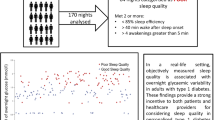Abstract
To compare sleep quality and sleep–wake patterns in parents of children with type 1 diabetes before routine use of the continuous glucose monitoring system (CGMS) and while using it. Thirteen parents completed the Pittsburg Sleep Quality Index (PSQI), a 7-day sleep diary, and wore an actigraph (a wristwatch-size motion detector) during the night for 1 week before pediatric use of CGMS and 4–8 weeks after initiating routine use of the CGMS. Mean age of parents (ten mothers, three fathers) was 39 (range 32–47) years; mean age of children was 9.3 years (range 5.5–16.5 years); mean disease duration was 3.4 (range 0.6–11.2) years. PSQI total score demonstrated similar quality of sleep with and without use of the CGMS (4.6 and 4.9, respectively, p = 0.45). Six of the 13 parents reported severe sleep problems (PSQI ≥ 5) with and without the CGMS. The sleep diary indicated a greater number of awakening episodes during CGMS use than without the CGMS (1.6 and 1, respectively, p = 0.03), and actigraphy documented an increase in the number of wake bouts (22.9 and 19.7, p = 0.03) as well as in total wake time (48.3 and 42.2 min, p = 0.03) during CGMS use as compared with the period prior to CGMS use. Although self-perception of sleep quality remained unchanged, CGMS use appeared to affect actual parental sleep continuity somewhat negatively. This should be made clear to parents who may hold expectations of improvement in sleep quality following initiation of CGMS use.
Similar content being viewed by others
References
Canam C (1993) Common adaptive tasks facing parents of children with chronic conditions. J Adv Nurs 18(1):46–53
Sullivan-Bolyai S, Deatrick J, Gruppuso P, Tamborlane W, Grey M (2003) Constant vigilance: mothers’ work parenting young children with type 1 diabetes. J Pediatr Nurs 18(1):21–29
Barnard K, Thomas S, Royle P, Noyes K, Waugh N (2010) Fear of hypoglycaemia in parents of young children with type 1 diabetes: a systematic review. BMC Pediatr 10:50
Monaghan MC, Hilliard ME, Cogen FR, Streisand R (2009) Nighttime caregiving behaviors among parents of young children with Type 1 diabetes: associations with illness characteristics and parent functioning. Fam Syst Health 27(1):28–38
Meltzer LJ, Moore M (2008) Sleep disruptions in parents of children and adolescents with chronic illnesses: prevalence, causes, and consequences. J Pediatr Psychol 33(3):279–291
Estrada CL, Danielson KK, Drum ML, Lipton RB (2011) Insufficient sleep in young patients with diabetes and their families. Biol Res Nurs
Buysse DJ, Reynolds CF, Monk TH, Berman SR, Kupfer DJ (1989) The Pittsburgh Sleep Quality Index: a new instrument for psychiatric practice and research. Psychiatry Res 28(2):193–213
Carpenter JS, Andrykowski MA (1998) Psychometric evaluation of the Pittsburgh Sleep Quality Index. J Psychosom Res 45(1):5–13
Shochat T, Tzischinsky O, Oksenberg A, Peled R (2007) Validation of the Pittsburgh Sleep Quality Index Hebrew translation (PSQI-H) in a sleep clinic sample. Isr Med Assoc J 9(12):853–856
Jean-Louis G, von Gizycki H, Zizi F, Fookson J, Spielman A, Nunes J, Fullilove R, Taub H (1996) Determination of sleep and wakefulness with the actigraph data analysis software (ADAS). Sleep 19(9):739–743
Sadeh A, Acebo C (2002) The role of actigraphy in sleep medicine. Sleep Med Rev 6(2):113–124
Sadeh A, Sharkey KM, Carskadon MA (1994) Activity-based sleep–wake identification: an empirical test of methodological issues. Sleep 17(3):201–207
Buysse DJ, Grunstein R, Horne J, Lavie P (2010) Can an improvement in sleep positively impact on health? Sleep Med Rev 14(6):405–410
Acknowledgments
We gratefully acknowledge the time and energy contributed by all parents during the progress of this study.
Conflict of interest
None.
Human and Animal Rights disclosure
All procedures followed were in accordance with the ethical standards of the responsible committee on human experimentation (institutional and national) and with the Helsinki Declaration of 1975, as revised in 2008.
Informed consent disclosure
Informed consent was obtained from all patients for being included in the study.
Author information
Authors and Affiliations
Corresponding author
Additional information
Communicated by Antonio Secchi.
Z. Landau and M. Rachmiel have contributed equally to this work.
Rights and permissions
About this article
Cite this article
Landau, Z., Rachmiel, M., Pinhas-Hamiel, O. et al. Parental sleep quality and continuous glucose monitoring system use in children with type 1 diabetes. Acta Diabetol 51, 499–503 (2014). https://doi.org/10.1007/s00592-013-0545-z
Received:
Accepted:
Published:
Issue Date:
DOI: https://doi.org/10.1007/s00592-013-0545-z




